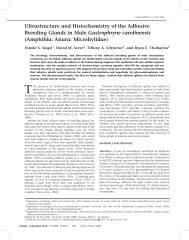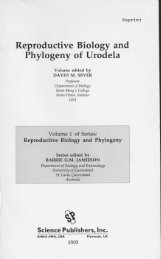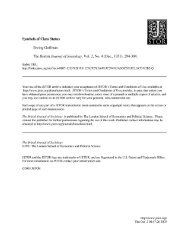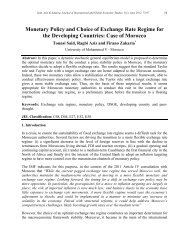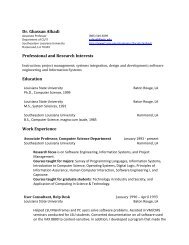Marvelous Facts and Miraculous Evidence in Early Modern Europe ...
Marvelous Facts and Miraculous Evidence in Early Modern Europe ...
Marvelous Facts and Miraculous Evidence in Early Modern Europe ...
You also want an ePaper? Increase the reach of your titles
YUMPU automatically turns print PDFs into web optimized ePapers that Google loves.
120 Lorra<strong>in</strong>e Daston<br />
<strong>Facts</strong> <strong>and</strong> <strong>Evidence</strong><br />
<strong>in</strong>g doctr<strong>in</strong>e, was required to establish div<strong>in</strong>e credentials. If the doctr<strong>in</strong>e<br />
was disputed, miracles could no longer settle the issue, for they then<br />
became signs without clear signification. A miracle unannounced by doctr<strong>in</strong>e<br />
was no miracle at all, even if not under suspicion of fraud. Glanvill<br />
quoted with approval the Reverend Doctor R. Dean's op<strong>in</strong>ion that the<br />
cures performed by Greatrakes, the "Irish Stroker," were "'more than<br />
ord<strong>in</strong>ary' " but " 'not miraculous' ": for not only did Greatrakes's patients<br />
occasionally suffer relapses, "He pretends not to give Testimony to any Doc-<br />
tr<strong>in</strong>e" (ST, p. 53). Although Locke shook his head over the credulity of the<br />
ancients, who accepted their religion without any evidence-that is, without<br />
miracles-he was quick to rule out any mission <strong>in</strong>consistent with "natural<br />
religion <strong>and</strong> the rules of morality," however wondrous its works.84 In<br />
seventeenth-century evidentiary theology, miracles began as "the pr<strong>in</strong>ci-<br />
pal external Proof <strong>and</strong> Confirmation of the Div<strong>in</strong>ity of a Doctr<strong>in</strong>e"; they<br />
ended as themselves requir<strong>in</strong>g "Proof <strong>and</strong> Confirmation" from doctr<strong>in</strong>e.<br />
Conclusion: Naturalization <strong>and</strong> the Reassertion of Authority<br />
Even after miracles had lost their peculiar evidentiary power to com-<br />
pel belief unambiguously <strong>and</strong> automatically <strong>in</strong> early eighteenth-century<br />
theology, they did not immediately wither away. It took some forty years<br />
before the likes of Hume <strong>and</strong> Voltaire could discuss the problem of miracles<br />
as if it were one of the evidencefor miracles, as opposed to the evidence<br />
ofmiracles.85 However, evidentialist theologians did un<strong>in</strong>tentionally<br />
prepare the way for this shift. First, by depriv<strong>in</strong>g miracles of evidentiary<br />
autonomy, they also deprived them of their ostensive function. If miracles<br />
require the evidence of doctr<strong>in</strong>e, who needs the evidence of miracles?<br />
Among orthodox British theologians, not to speak of Deists like Tol<strong>and</strong><br />
<strong>and</strong> Anthony Coll<strong>in</strong>s, portents <strong>and</strong> miracles played an ever more modest<br />
role <strong>in</strong> Christian apologetics. Although none of them would have thought<br />
of deny<strong>in</strong>g their existence or importance <strong>in</strong> the early Church, late<br />
seventeenth-century theologians assumed an ever more condescend<strong>in</strong>g<br />
tone toward their predecessors for requir<strong>in</strong>g such a vulgar sort of proof.<br />
Whereas Christ had been forced by his motley audience to address "the<br />
lower faculties of the Soul, phancy <strong>and</strong> imag<strong>in</strong>ation" with showy miracles,<br />
nowadays "all th<strong>in</strong>gs are to be managed <strong>in</strong> a more sedate, cool, <strong>and</strong> silent<br />
manner," by <strong>in</strong>vok<strong>in</strong>g "steady <strong>and</strong> calm arguments" (DCP, p. 27-28). Just<br />
because miracles were "such sensible Demonstrations," they penetrated<br />
84. Locke, A Discourse of Miracles, 9:261.<br />
85. See Voltaire, "Miracles," Dictionnaire philosophique, <strong>in</strong> Oeuvres completes (1764;<br />
Paris, 1783), 42:88-113, <strong>and</strong> David Hume, "On Miracles," Essays Moral, Political <strong>and</strong> Liter-<br />
ary (1741-42; London, 1963).



